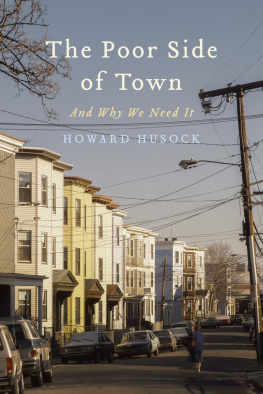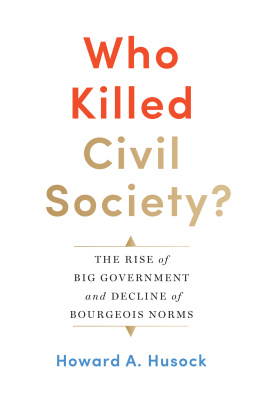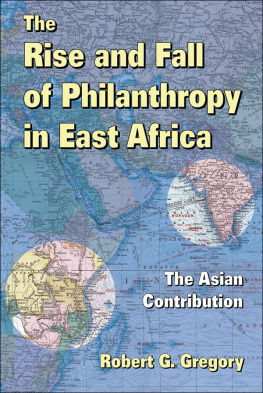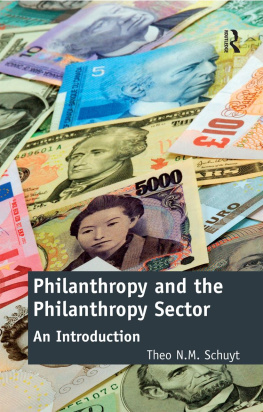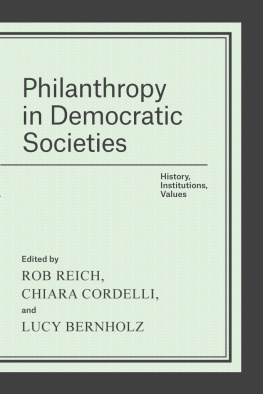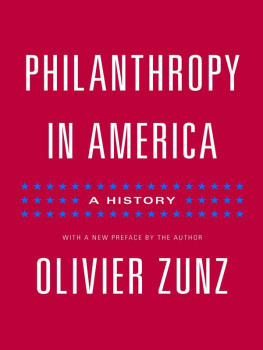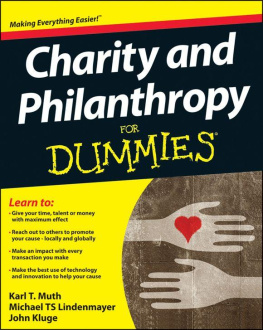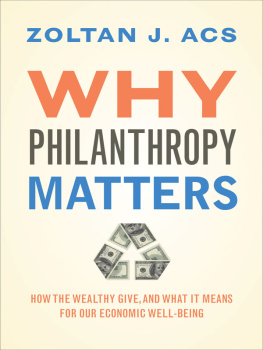
ENCOUNTER BROADSIDES : a new series of critical pamphlets from Encounter Books. Uniting an 18th-century sense of political urgency and rhetorical wit (think The Federalist Papers, Common Sense) with 21st-century technology and channels of distribution, Encounter Broadsides oVer indispensable ammunition for intelligent debate on the critical issues of our time. Written with passion by some of our most authoritative authors, Encounter Broadsides make the case for liberty and the institutions of democratic capitalism at a time when they are under siege from the resurgence of collectivist sentiment. Read them in a sitting and come away knowing the best we can hope for and the worst we must fear.

Table of Contents
Philanthropy Under Fire
I T MAY NOT BE at all obvious that this is a time to characterize the American tradition of philanthropy as being under fire. Indeed, overall U.S. charitable giving, at nearly $300 billion, is close to a record level and the percentage of the nations economy devoted to it is (at 2.2 percent) twice that of the next closest nation (the United Kingdom, at 1.1 percent). Whats more, philanthropy has been enthusiastically embraced by a new generation of the very wealthy. Led by Bill Gates and Warren Buffett, some 92 billionaires have signed on to the Giving Pledge to donate more than half their fortunes to good causes over the course of their lifetime.
Yet below the surface, the traditions of philanthropy, individual charity, and the organizations they support are facing both sustained intellectual criticism and policy proposals that could significantly limit them. Note the use of the term independent philanthropy by which I mean charitable giving directed, perhaps even conceived, by its donor. It is this independence that is under fire. Serious critics assert that unless charity is directly redistributionist meaning that the wealthy transfer asserts to organizations that directly assist the poor its not really charitable at all. In addition, there are public policy proposals, including one from the Obama White House that would erode the value of the long-standing tax incentive for charitable giving or limit it to select purposes. Finally, there has even emerged what can be termed government-led philanthropy in which Washington chooses both goals and organizations and actively calls for private donors to direct their funds toward matching those same priorities. This follows decades, beginning in the 1960s, when nonprofit charitable organizations that were founded to serve those in need came increasingly to work under contract to the government, rather than relying on private donations.
In short, there is decreasing contemporary support for, and a diminishing awareness of, the tradition of what can be called independent philanthropy charitable giving directed by donors themselves (or their agents) not in partnership with or at the direction of government but rather at their own discretion. Its the sort of giving that one of the first important American philanthropists, Andrew Carnegie, had in mind when he wrote of the benefits that accrue when the surplus wealth of the few will become, in the best sense, the property of the many, because administered for the common good, and this wealth, passing through the hands of the few, can be made a much more potent force for the elevation of our race than if it had been distributed in small sums to the people themselves (emphasis added). The goal, wrote Carnegie, is for philanthropy to succeed in the difficult and serious task of wise distribution.

Philanthropy and even the smallest gifts of individual charity have a deep relationship with and a promotion of democratic values.

I want to make a case for this sort of independent philanthropy and will focus on three key attributes of such giving and what it enables. First notwithstanding charges of elitism philanthropy and even the smallest gifts of individual charity have a deep relationship with and a promotion of democratic values. They are not only in keeping with democracy, but they also help strengthen it. Second, their importance is, whats more, practical as well as theoretical. Independent philanthropy can embody imagination and creativity; it can have the courage to disdain conventional wisdom and recognize and address social needs. Third, even when it eschews partnership with government, it has, nonetheless, the ability to reach broadly and effectively by influencing the norms of values and behavior.
In short, to the extent that America continues to rein in the independence of philanthropy, we do so at our own risk.
N ONPROFITS AND THE S TATE
The traditions of philanthropy and individual charity and the organizations that they support are deeply established in the culture of the United States. Famously, Alexis de Tocqueville, writing in 1840, could observe, Americans of all ages, all conditions, and all dispositions, constantly form associations of a thousand other kinds religious, moral, serious, futile, excessive or restrictive, enormous, or diminutive. In this manner they found hospitals, prisons, and schools.
Indeed, so well established was this tradition that virtually from the time the federal income tax was established, in 1913, provision was made (in 1917) for the tax deductibility (and thus a decrease in tax liability) of contributions to nonprofit charitable organizations. Members of Congress were concerned that prominent organizations such as the American Red Cross would face reductions in support, demonstrating that major nationally known nonprofits were already a feature of American life and that their support was broad-based. As a report of the Joint Committee on Taxation has put it, the deduction was viewed as an effective way to distribute public money to charities, as it cut out the government middlemen. Many believed charities could deliver social services better than the government and that it was appropriate for individuals rather than the government to decide which charities to support.
The accomplishments of American philanthropy are too extensive to list. They include the libraries of Andrew Carnegie, the universities founded by John D. Rockefeller and Leland Stanford, the green revolution agricultural breakthroughs supported by the Ford Foundation, and, more recently, the breakthroughs in medical and genetic research enabled by the Broad Foundation and others. Nonetheless, in the present era of dramatically greater government spending on social services than was the case in 1917, as well as persistent federal deficits and growing public debt to which the tax deduction for charitable giving makes a modest contribution the American philanthropic tradition has come under fire.
The criticisms are multiple. Its said that philanthropy is undemocratic precisely because, as the Joint Committee stated, it reduces donors tax liability (and thus federal revenues) while permitting them to decide, on their own and with little oversight, where their funds should be directed. A related criticism asserts that many organizations receiving philanthropic support do not serve those demonstrating the greatest economic need owing, as one critic has said, to a pattern of giving that appears hard to reconcile with redistributive outcomes. In other words, philanthropys favorable tax treatment reduces tax revenue that would otherwise be put to purposes more beneficial to the public. Even scholars who are sympathetic to the mission of the nonprofit institutions for which charitable donations are the lifeblood view such giving as most defensible when it supports organizations that are also the beneficiaries of government grants and contracts. According to this view, the reach of charitable nonprofits is best extended by the use of public funds to supplement private, charitable resources and thereby extend their reach through a partnership with the government.


